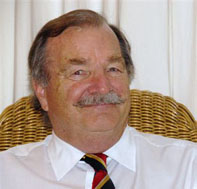I have always enjoyed history.
If you think history lacks humour then you haven’t heard of “feel-good history”. Feel-good history is a branch of history where the authors set out to make people feel good about their past. I was taught it at school in Britain during and after World War 2.
We were told that the dense smogs that settled over Britain and brought its traffic to a standstill for days on end were a sign of Britain’s industrial might and how this had enabled us to buy up whole countries in Africa, freehold, for vast sums of beads. Sometimes beads were not enough and so gunboats were used. But as kids we felt good about it.
Every community has its own version of history, some dafter than others.But in the United States , “African-American Baseline Essays” published by the Portland Public Schools Board, was recently censured for going too far. Their history book said black people in Africa invented the aeroplane.
Where the Portland essays were accused of going overboard was in giving the impression that, first, all Ancient Egyptians were black and, second, that they invented the aeroplane. The essay claimed a 14 cm model glider was, at some stage, unearthed somewhere in Egypt and quotes an obscure British authority saying “the ancient Egyptians used their early planes for travel expeditions and recreation …”
Personally I was surprised that there should be any controversy. It is common knowledge in the circles in which I move – mainly tight circles – that the Ancient Egyptians had aeroplanes and flew them all over the place.
These planes were originally called Pharaoh-planes in honour of the 18th dynasty of Pharaohs who financed their research and development. After the Pharaohs died out the “ph” was dropped and the machines were simply called “araoh-planes” and, later, “aeroplanes” (Annals of Heavier than Air Machines, Tablets III-IV. 3/7/1999BC.).
A pharaohdrome was recently unearthed near Cairo (op cit).
The first Pharaoh-plane was developed at Luxor by none other than Damocles Caliph III and was named the DC3 in his honour. It was known as a heavier-than-air machine on account of it being made from the same type of stone as the Pyramid of Khufu (cit op).
It was not terribly successful as aircraft go (el cid). Few Egyptologists have been prepared to admit that the pyramids were designed not as tombs but as launch pads for the Mark 1 pharaoh-plane. Slaves would drag the machine to the top, pour honey down the sides for lubrication, and release the aircraft down the slope.
There were lots of accidents. How do you think the Sphinx lost its nose? The first planes simply speared into the sand but Thutmose IV ordered a lighter and more porous stone from Thebes and this led to the first reported flight by Mentuhotep II (none other) in 1286 BC at Kittihorus (Ibid., op cit. sit op.).
Many who witnessed its flight over the First Cataract thought it was a swan and cried out “A swan! A swan!” From this incident Aswan, just below the cataract, derives its name.
Did YOU know that?
Eurocentric history books do not record that Nefertiti began her career as an airhostess with Ancient Egyptian Airlines (Annals of Ramses II 1174 BC, Tablets IV – VII). The general manager was the up-and-coming Tutankhamen.
It is also not widely known that another great Egyptian queen began her career as an airline hostess (Op cit., El Al) – Cleopatra herself. Cleopatra eventually founded Cleo’s Air Operations, abbreviated as C-AIR-O. The name was eventually adopted by Egypt’s capital.
Nebuchadnezzar of Babylon, after defeating the Egyptians by verily smiting them with large catapulted rocks, took over the airline and unwisely started a price war with the Bedouin caravans whose camels were in fact faster than even the later Bronze Age aeroplanes, weight still being quite a problem.
The last Ancient Egyptian Airlines plane to fly had none other than the Roman, Pontius Pilot, at the controls. The plane crashed in the desert near A-syut in the Lower Nile Valley. According to legend the name, A-syut, is derived from Pontius Pilot’s last words before he hit the ground.
Aircraft made a brief comeback in the Early Iron Age but again the material was unsuitable. It was left for Wilbur and Orville Wright to re-invent the plane in the 20th century.(Email: jcl@onwe.co.za)
Filed under: General, StoepTalk | Tagged: Ancient Egypt, aviation history, humour, stoep talk | Leave a comment »




